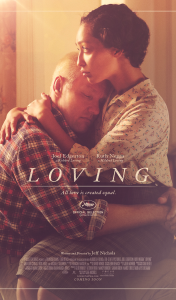 Writer and director Jeff Nichols’ historical drama “Loving” tells the story of Richard and Mildred Loving, the plaintiffs in the 1967 U.S. Supreme Court decision Loving v. Virginia, which invalidated state laws prohibiting interracial marriage. After being arrested and sentenced to prison in Virginia in 1958, the couple was exiled to Washington, D.C., where they began court proceedings that would eventually lead to one of the most impactful civil rights victories in history.
Writer and director Jeff Nichols’ historical drama “Loving” tells the story of Richard and Mildred Loving, the plaintiffs in the 1967 U.S. Supreme Court decision Loving v. Virginia, which invalidated state laws prohibiting interracial marriage. After being arrested and sentenced to prison in Virginia in 1958, the couple was exiled to Washington, D.C., where they began court proceedings that would eventually lead to one of the most impactful civil rights victories in history.
Nichols makes it clear that the couple — masterfully played by Joel Edgerton (Richard Loving) and Ruth Negga (Mildred Loving) — were simple, everyday people who did not set out to make history. Through a slow, deliberate script that highlights the modest interactions between the two lovers, viewers come to understand that the couple wanted nothing more than to love one another without living in constant fear.
With “Loving,” Nichols has created a steady, unembellished and sensitive film. Events and conversations are unhurried, and the silence often hangs heavy. It contradicts the tendency for many modern movies to rush from scene to scene, emotion to emotion for fear of losing the audience’s attention. This film’s pace is a large part of what makes it so captivating.
Richard Loving, in particular, mirrors the slow pace of the movie. Edgerton sinks deeply into his quiet character, embodying a simple countryman with tobacco-stained teeth, a furrowed brow, a modest job and a deep affection for the woman he loves. In moments when we would expect him to erupt in fury or celebration, like in the opening scene when Mildred tells him that she’s pregnant, we see his eyes fall and a retreat into his thoughts. This silence in the face of conflict or excitement shows a different and misunderstood side of masculinity.
For those who are not familiar with the type of man that Richard Loving was — uneducated, naturally withdrawn and focused on his family — it is easy to presume that his representation in the film is dull. However, Edgerton not only perfectly embodies the simplicity of who Richard Loving was and the life he lived but also highlights the effortless chemistry between him and Negga.
When she is onscreen, Negga commands the entire scene. Although she is quiet, Mildred Loving’s dignity and strength define her character, especially in moments of weakness. It is Negga who, after being driven out of her home state to live in a crowded, miserable part of D.C. with Richard and their three children, finds it within herself to seek change. Motivated by a civil rights march led by Martin Luther King, Jr., that she briefly sees on the television one day, she writes a letter to Robert Kennedy, who forwards it to the American Civil Liberties Union.
Where “Loving” falls short is its refusal to expand beyond a narrow scope of emotion. Although the film is tender and sweet in its simplicity, the outrage and frustration that the Loving family undoubtedly felt is completely absent. To put it simply, the film’s style feels much too restrained. Nichols leaves it up to the audience to fill in the blanks with their understanding of the cultural and societal forces behind the racism that infiltrates the life of the Lovings.
The strengths and the weaknesses of “Loving” go hand-in-hand. The director’s careful casting of lesser-known actors and a script full of subtleties provide an endearing testament to the simple people the story represents, but it also leaves some major holes. The film almost entirely skips over the Supreme Court trial, except for the opening remarks of the couple’s lawyers, Bernie Cohen (Nick Kroll) and Phil Hirschkop (Jon Bass).
The Lovings refused to attend the trial in order to preserve the dignity of their family and learned of the verdict via telephone. The film’s reaction to the news can either be disappointing or beautiful. The couple simply carries on with their lives, as if the decision is just a simple validation of something they have known all along. Still, there is beauty and inspiration in this ending, as it cements the film as an exploration of the uncomplicated love between two people who simply longed to be together.















Jo Lawton • Dec 3, 2016 at 12:32 pm
Well-analyzed and very well written!